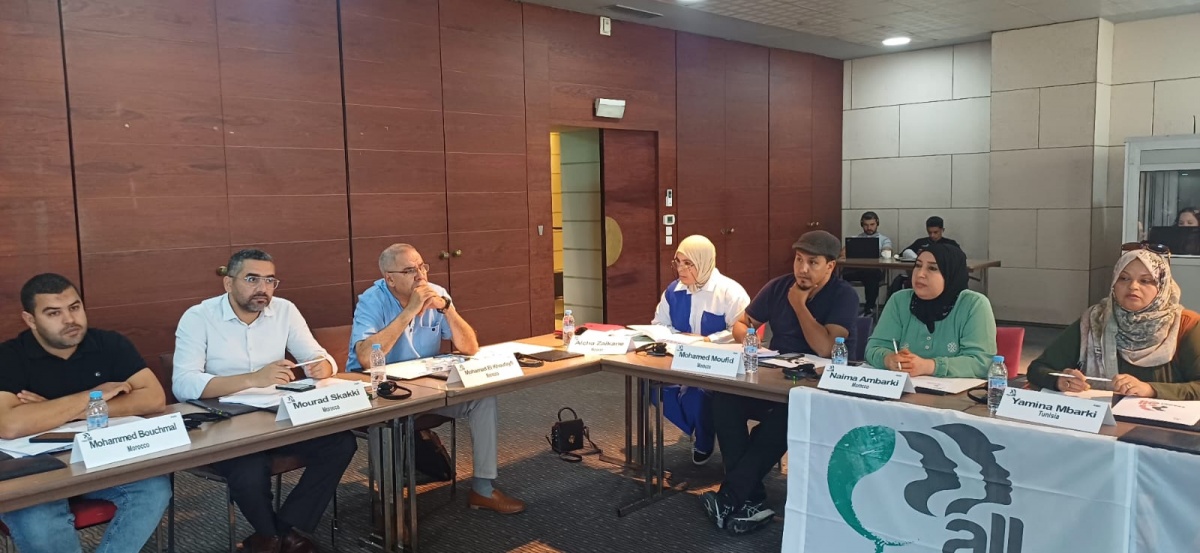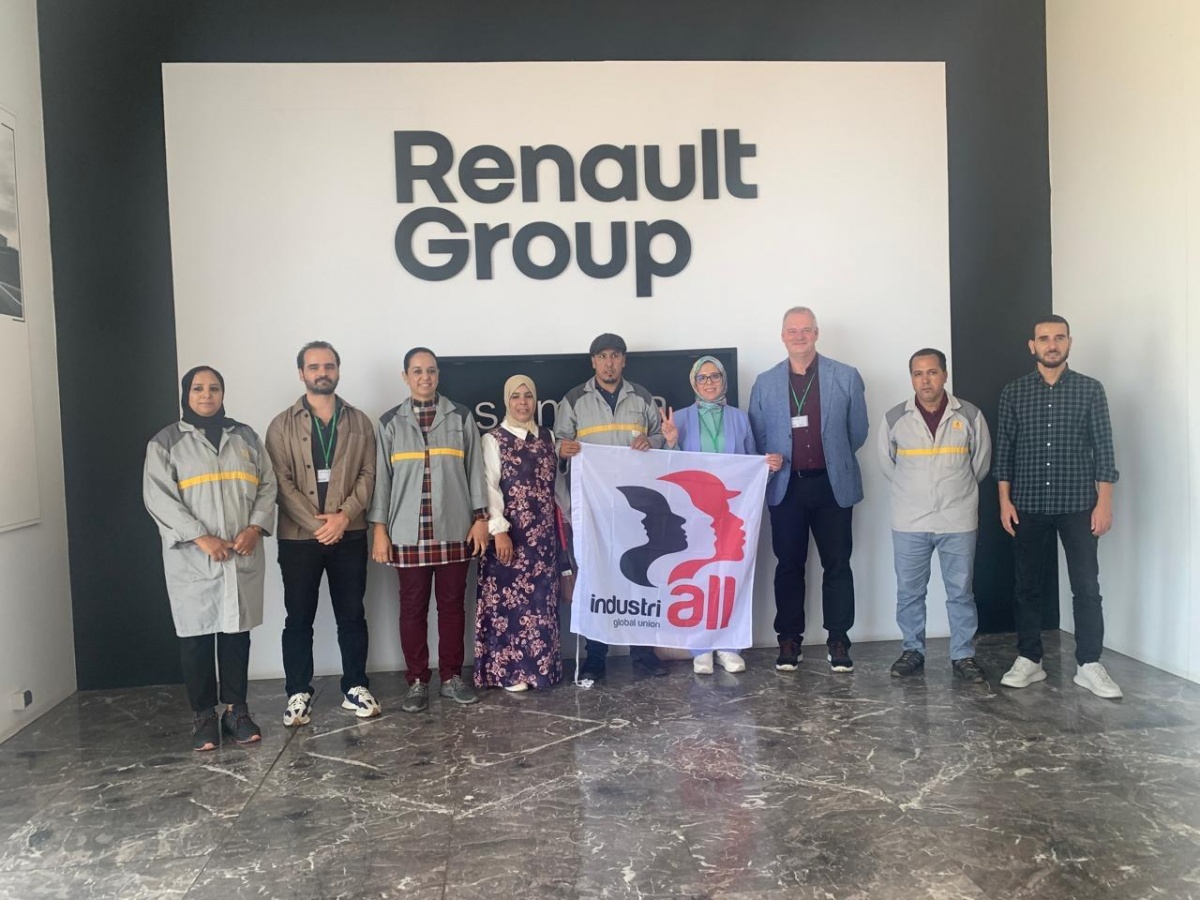Read this article in:
English
5 November, 2024In October 2024, IndustriALL organized the MENA automotive industry unions week in Morocco, with the participation of union leaders from Egypt, Tunisia and Morocco. On 6-7 October, the MENA automotive union network met to Just Transition, organizing and workers’ challenges.
Georg Leutert, IndustriALL automotive director, stressed that workers are the most important issue in the transition as they bear the brunt of the consequences. Companies replace workers by introducing more automated manufacturing processes and by digitizing the entire business for the sake of efficiency and this is where unions must intervene to ensure a just transition.
The automotive industry is made up of two parts; the long-standing car manufacturers that have stable collective agreements with local unions and IndustriALL, and newer players, mainly Chinese and American companies , especially in the field of electric and autonomous vehicles.
“These are companies with huge investment capacities, but they don’t automatically recognise or understand trade unions, which is a major challenge. IndustriALL is now trying to bring the parties to the negotiating table to draft new agreements,“
said Georg Leutert.
Participating unions presented updates on their current situation, progress and action plans for 2025-2030 since the last meeting. Unions agreed to focus on two issues:
- to include unions in negotiations related to the transformation of the labour market and industry
- to negotiate with companies for solutions to offset negative repercussions of the transition, most notably layoffs and job losses
The network issued a statement on just transition, calling for the sustainability of existing jobs and the creation of new jobs that respect workers' rights and decent work principles. The statement also calls for social protection, alternatives and adequate compensation for workers exposed to job losses during transitions.

Network members also called for national and sectoral social dialogue on transition policies in the industrial sectors, with the active involvement of trade unions.
Ahmed Kamel, IndustriALL MENA regional secretary, said:
“The MENA region is an example of how the industry is evolving at a global level with the expansion of multinational, especially Chinese companies in the region, the technological and environmental changes due to climate change, and the challenges of union recognition. Having a work plan with structures to implement it allows us to strengthen the unions further.”
Hossam Eddine Dhayaf, assistant general secretary of Fédération Générale de la Métallurgie et de l'Electronique - FGME-UGTT Tunisia, said:
“Transition is already happening, at the expense of the South and at the expense of workers. We must unite trade union efforts and unify objectives in order to give the transition its just character. This can only be done through the formulation of a joint action plan."
Mohamed Moufid, general secretary of Syndicat Nationale des Industries de la Métallurgie et Electromécanique - SNIME-CDT Morocco, said:
“The reliance on new technologies represents a risk to the future of workers, forcing unions to take a position to make the transition fair and not at the expense of workers. Especially for women, who are in a difficult situation that needs to be overcome.”
Nora Elmoustahy, leader of Fédération Nationale de la Métallurgie et des Industries Synthétiques Métallurgiques et Electroniques - FNMISME – UMT Morocco, said:
“When Renault introduced robotics in the production cycle, the union negotiated to reintegrate the laid-off workers into a new department that deals with the maintenance of the robots that replaced them. Through negotiations, the union also succeeded in convincing the company to rely on the laid-off workers in new projects, meaning that the company prioritises the laid-off workers in new projects.”
Nouzha Elmarzouki leader at Fédération Générale de la Métallurgie et de l'Electronique - FGME-UGTT Tunisia, said:
“At Kromberg & Schubert, due to climate change we successfully negotiated improvements to the workplaces to address high temperatures by providing cooling systems for the workplace."
Attacks on trade union freedoms, ending dialogue with unions, and the expulsion of union members make the environment for unions very difficult. Employers shut unions out from workplaces, preventing unions from communicating with workers. Restrictions on trade union work and the governments' bias in favour of employers are big barriers to organizing. But in the face of adversity, unions have managed to increase membership through campaigns and will continue to work to increase membership, targeting a number of companies to increase membership by 15 per cent by 2030.
IndustriALL’s global framework agreements with multinational companies have been useful tools in organizing and have increased union membership in a number of companies. Affiliates linked organizing to the ability to win demands on the one hand, and to the trade union respect and freedoms and on the other. Participants emphasised the importance of supporting training and developing trade union skills in order to develop future plans.
Khaled Taher, general secretary of Fédération Nationale de la Métallurgie et des Industries Synthétiques Métallurgiques et Electroniques - FNMISME – UMT Morocco, said:
“We thank IndustriALL for the continuous support for union initiatives in the sector, and for trainings. This week will allow an exchange of experiences and strengthen solidarity in the sector, which is undergoing a qualitative leap in Morocco. A common struggle with a united will can remove obstacles and make the impossible possible.”
Abdelrahman Soliman, leader of Egyptian Industries unions of automotive sector, said:
“We are pleased to participate in this week, an important occasion for exchange and learning. We experience difficulties in trade union work, but the new generation of trade unionists are working hard to support workers' rights and strengthen trade union work."
Abdelaziz Arfaoui, general secretary of Fédération Générale de la Métallurgie et de l'Electronique - FGME-UGTT Tunisia, said:
“There is a lot of hard work in developing trade union work, especially at the level of networks, which have been an important addition to improve union work in the supply chain. For us, the results are important, and this is what is realised on the ground. We have set a number of trade union goals in the automotive sector and we are working to achieve them.”
Yamina Mbarki, assistant general secretary of Fédération Générale de la Métallurgie et de l'Electronique - FGME-UGTT Tunisia, said:
“The Covid pandemic, the Russian-Ukrainian war and now the war on Gaza, are all crisis affecting the sector, but this has not prevented us from achieving important progress on organizing through campaigns in workplaces. Good results have been achieved despite attempts of some management to obstruct the campaigns and prevent trade unionists from communicating with workers. We aim to increase membership by 15 per cent by 2030.”
Stellantis MENA union council meeting
The Stellantis MENA union council, made up of affiliates and suppliers in North Africa, met on 7-8 October 2024. Identifying main objectives and issues that hinder the work of trade unionists, participants developed work plans for the coming period. These which will focus on social dialogue and improving safety and health, while stressing the importance of greater coordination and concerted efforts to integrate suppliers into an effective social dialogue across the Stellantis production network in the region.
IndustriALL, Renault MENA union council and Renault global works council and management meeting
The meeting on 8 October 2024 was an important opportunity for unions and management to meet and raise important issues. The delegation of the Renault MENA union council presented its view on the most important developments in the automotive industry in the region and Morocco, focusing on important developments at Renault.

The delegation expressed its appreciation for the constructive social dialogue with management, which resulted in a collective agreement, and noted the importance of developing the dialogue to include a Just Transition, especially in light of the increasing reliance on robotics and the development of new types of cars that require different and new skills. The delegation presented the work priorities for the coming period and the importance of learning about different experiences. The delegation was briefed on the experiences of Renault's unions and workers in different regions around the world. For their part, the Renault global works council delegation and management expressed their appreciation for the meeting and the importance of continuing to communicate with Renault MENA union council and developing joint work.
This meeting was preceded by the Renault MENA union council, which examined various developments and prioritized the most pressing issues to be discussed with management.
Strategic planning update workshop for metal union in Morocco
Two workshops on strategic planning were organized for Moroccan metal unions SNIME-CDT and FNMISME–UMT, on 9-10 and 11-12 October 2024 respectively. The workshops assessed the reality and identified the most important challenges, after which the objectives were defined, action plans were drawn and the trade union team was selected to implement them. Special focus was given to increasing membership, improving safety and health, and developing social dialogue at industry level industry in Morocco.










